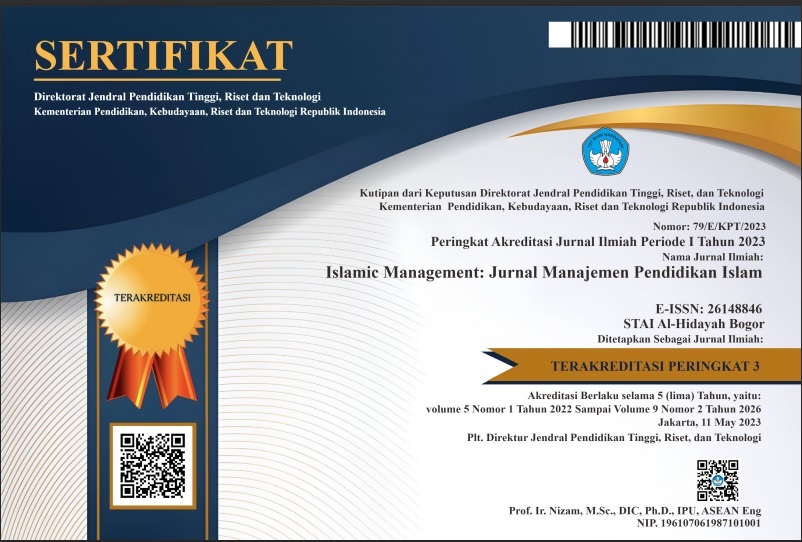MANAJEMEN PENYELENGGARA KEGIATAN HAUL GURU SEKUMPUL MARTAPURA KALIMANTAN SELATAN
DOI:
https://doi.org/10.30868/im.v8i01.7638Keywords:
Manajemen penyelenggara, haul Guru Sekumpul, HadramutAbstract
Haul guru sekumpul merupakan kegiatan tahunan yang diselenggarakan untuk memperingati hari wafatnya guru Muhammad Zaini Abdul Ghani Al-Banjari. Pelaksanaan haul diselenggrakan setiap lima Rajab yang titik pusatnya berada di Mushala Ar-Raudhah Sekumpul, Martapura, Kabupaten Banjar, Kalimantan Selatan. Jamaah yang menghadiri kegiatan haul abah guru sekumpul sangat banyak. Hal ini dapat dilihat pada pelaksanaan haul abah guru sekumpul yang selalu dihadiri sekitar jutaan jamaah, tidak hanya dari Indonesia namun dari beberapa negara yaitu Malaysia, Brunei Darussalam, Hadramaut (Yaman) dan Mekkah. maka sangat menarik untuk dikaji bagaimana manajemen penyelenggar kegiatan haul tersebut. Adapun pendekatan yang digunakan dalam penelitian ini adalah kualitatif dengan jenis studi kasus. Subjek yang dijadikan sebagai sumber data adalah pelaksana kegiatan dan jamaah yang menghadiri kegiatan haul guru sekumpul dengan teknik pengumpulan data melalui observasi, wawancara dan dokumentasi. Analisis yang diterapkan yaitu reduksi, display dan verifikasi data. Teknik pengabsahan data dengan triangulasi sumber dan teknik. Hasil penelitian menunjukkan bahwa manajemen penyelenggara kegiatan haul Guru Sekumpul meliputi: 1) perencanaan yang berdasarkan pada tujuan dan sasaran; anggaran; menyusun anggaran yang mencakup semua kebutuhan acara; dan tim panitia. 2) Pelaksanaan memperhatikan hal berikut ini: koordinasi; logistik; acara; dan komunikas. 3) Evaluasi meliputi: penilaian kinerja; laporan; dokumentasi; dan lokasi dan waktu.
References
Affandy, Didied,.et al. 2012. An Exploration Local Wisdom Priority in PublicBudgeting Process of Local Government: Case Study in East Java. Journal Eco Res, Vol. 315, Hal. 61-76, ISSN: 2229-6158.
Allen, D. (2001). Getting Things Done: The Art of Stress-Free Productivity. Penguin Books.
Bass, B. M., & Riggio, R. E. (2006). Transformational Leadership. Lawrence Erlbaum Associates.
Belotto, M. (2018). Data Analysis Methods for Qualitative Research: Managing the Challenges of Coding, Interrater Reliability, and Thematic Analysis. The Qualitative Report, 23(11), 2622–2633. https://doi.org/10.46743/2160-3715/2018.3492
Berlo, D. K. (1960). The Process of Communication: An Introduction to Theory and Practice. Holt, Rinehart, and Winston.
Bintoro dan Daryanto. (2017). Manajemen Penilaian Kinerja Karyawan. Cetakan 1. Yogyakarta: Gava Media
Campbell, S., Greenwood, M., Prior, S., Shearer, T., Walkem, K., Young, S., Bywaters, D., & Walker, K. (2020). Purposive sampling: Complex or simple? Research case examples. Journal of Research in Nursing, 25(8), 652–661. https://doi.org/10.1177/1744987120927206
Carter, S. M., Shih, P., Williams, J., Degeling, C., & Mooney-Somers, J. (2021). Conducting Qualitative Research Online: Challenges and Solutions. The Patient, 14(6), 711–718. https://doi.org/10.1007/s40271-021-00528-w
Covey, S. R. (1989). The 7 Habits of Highly Effective People: Powerful Lessons in Personal Change. Free Press.
Heath, J., Williamson, H., Williams, L., & Harcourt, D. (2018). “It’s just more personal”: Using multiple methods of qualitative data collection to facilitate participation in research focusing on sensitive subjects. Applied Nursing Research, 43, 30–35. https://doi.org/10.1016/j.apnr.2018.06.015
Herzberg, F. (1966). Work and the Nature of Man. World Publishing Company.
Hillson, D., & Simon, P. (2021). Practical Project Risk Management: The ATOM Methodology. Management Concepts.
Istiawati, F. N. (2016). Pendidikan Karakter Berbasis Nilai-nilai Kearifan Lokal Adat Ammatoa dalam Menumbuhkan Karakter Konservasi. Cendekia, 10(1), 1-18.
Kerzner, H. (2017). Project Management: A Systems Approach to Planning, Scheduling, and Controlling. Wiley.
Marwansyah. (2016). Manajemen Sumber Daya Manusia. Edisi kedua. Bandung: CV Alfabeta.
Maslow, A. H. (1954). Motivation and Personality. Harper & Row.
Mohajan, H. (2018, Desember 10). Qualitative Research Methodology in Social Sciences and Related Subjects [MPRA Paper]. https://mpra.ub.uni-muenchen.de/85654/
Njie, B., & Asimiran, S. (2014). Case Study as a Choice in Qualitative Methodology. IOSR Journal of Research & Method in Education (IOSRJRME), 4(3), 35–40. https://doi.org/10.9790/7388-04313540
Northouse, P. G. (2018). Leadership: Theory and Practice. Sage Publications.
Pace, D. S. (2021). Probability and Non-Probability Sampling—An Entry Point for Undergraduate Researchers. International Journal of Quantitative and Qualitative Research Methods, 9(2). https://papers.ssrn.com/abstract=3851952
PMI (Project Management Institute). (2017). A Guide to the Project Management Body of Knowledge (PMBOK® Guide). PMI.
Sartini. 2004. Menggali Kearifan Lokal Nusantara Sebuah Kajian Filsafati. Jurnal Filsafat. Jilid 37, Nomor 2, Agustus 2004, Halaman 111-120.
Shannon, C. E., & Weaver, W. (1949). The Mathematical Theory of Communication. University of Illinois Press.
Simon, H. A. (1979). Models of Bounded Rationality: Volume 1: Economic Analysis and Public Policy. MIT Press.
Von Bertalanffy, L. (1968). General System Theory: Foundations, Development, Applications. George Braziller.
Wagiran. 2010. Pengembangan Model Pendidikan Kearifan Lokal di Wilayah Provinsi DIY dalam Mendukung Perwujudan Visi Pembangunan DIY Menuju Tahun 2025 (Tahun Kedua). Penelitian. Yogyakarta: Biro Administrasi Pembangunan.
Wagiran. 2012. Pengembangan Karakter Berbasis Kearifan Lokal Hamemayu Hayuning Bawana (Identifikasi Nilai-nilai Karakter Berbasis Budaya). Yogyakarta: Universitas Negeri Yogyakarta.
Zainal, Veithzal Rivai. (2014). Manajemen Sumber Daya Manusia Untuk Perusahaan Dari Teori Ke Praktik. Edisi 3 Cetakan 6. Jakarta: Rajawali Pers.
Downloads
Published
How to Cite
Issue
Section
Citation Check
License
Copyright (c) 2025 Musyarapah Musyarapah, Noorazmah Hidayati

This work is licensed under a Creative Commons Attribution-ShareAlike 4.0 International License.
Authors who publish with this journal agree to the following terms:
- Authors retain copyright and grant the journal right of first publication with the work simultaneously licensed under a Creative Commons Attribution License that allows others to share the work with an acknowledgment of the work's authorship and initial publication in this journal.
- Authors are able to enter into separate, additional contractual arrangements for the non-exclusive distribution of the journal's published version of the work (e.g., post it to an institutional repository or publish it in a book), with an acknowledgment of its initial publication in this journal.
- Authors are permitted and encouraged to post their work online (e.g., in institutional repositories or on their website) prior to and during the submission process, as it can lead to productive exchanges, as well as earlier and greater citation of published work (See The Effect of Open Access).






